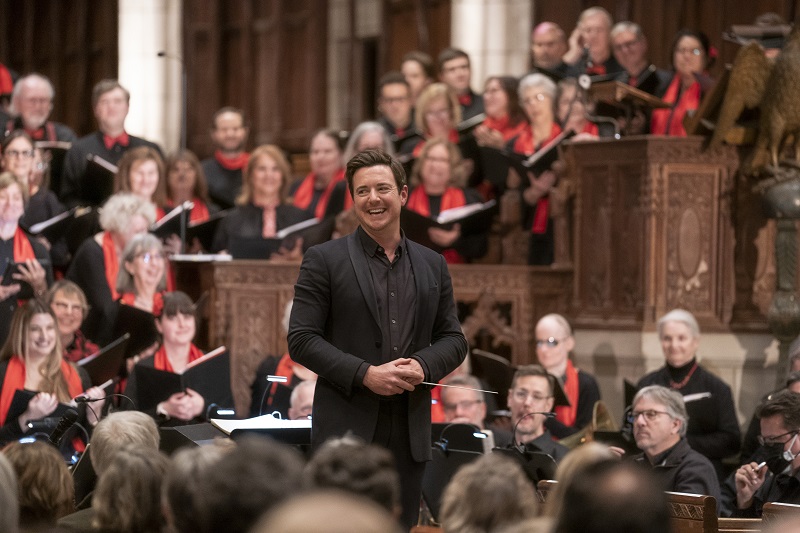Princeton Pro Musica’s Upcoming Concert Reflects Turing’s Accomplishment and Heartbreak
MUSIC THAT MATTERS: Princeton Pro Musica, led by Ryan James Brandau, presents “Codebreaker: The Alan Turing Story” at Richardson Auditorium on May 18. Brandau is shown here leading the chorus and orchestra in a previous performance.
By Anne Levin
When Princeton Pro Musica’s artistic director Ryan James Brandau considers what kinds of works to program for the 100-member symphonic chorus and orchestra, he finds himself returning to music written about the contributions of historical figures and what they endured to accomplish them.
There was Annelies, in 2022, James Whitbourn’s work based on the writings of Anne Frank. Sanctuary Road, more recently, drew from the writings of Underground Railroad conductor William Still. On May 18 at 4 p.m. at Richardson Auditorium, the chorus will present Codebreaker: the Alan Turing Story, composer James McCarthy’s choral work based on the pioneering British mathematician and logician whose work laid the groundwork for modern computing. Turing, who was gay, committed suicide in 1954 — a time when homosexuality was still a crime in Britain.
“We were overwhelmed by the reaction to Annelies,” Brandau said this week, “not just by the degree that audiences engaged in the performance, but by the way they reacted to the auxiliary offerings as well. We are well over 100 musicians gathered on stage, and that’s a powerful instrument. We wanted to do it again — a piece about a real person who went through something and had a piece of music written about it.”
Brandau learned of Codebreaker from a colleague, who had heard about the choral work from one of her students. He investigated and was immediately captivated by Turing’s story and the composer’s interpretation. Not to mention the Princeton connection — Turing earned a Ph.D. at Princeton University in 1938.
Turing is credited with breaking the German Enigma code in World War II, allowing the British to intercept and interpret key Nazi communications.
“In the same way that Annelies didn’t tell the whole story of Anne Frank, this composer [McCarthy] tried to find a few moments in Turing’s life that could provide a window into his life and essence,” said Brandau. “He didn’t leave behind reams of diaries or letters and writings, for obvious reasons. So McCarthy gathered some of his personal correspondence, and also a bunch of different poems by Oscar Wilde, Sara Teasdale, and others, to give us an access point for the story.”
McCarthy wrote Codebreaker for a symphonic chorus in the U.K. “The music is something that we can perform well,” Brandau said. “It’s a very appealing combination of movements for chorus and orchestra that have a propulsive and computational quality. We’re reminded that these very first computers that Turing created at Bletchley Park, to process all the code and try and crack the code, actually moved by clicks and dials. Many of the movements in the music have that quality.”
Other sections are for chorus only, without the orchestra. “The writing is a beautiful balance of the use of chorus and orchestra, both separately and together,” said Brandau.
Events leading up to the performance have included a Zoom book talk based on The Man Who Knew Too Much: Alan Turing and the Invention of the Computer; and a screening at Princeton Public Library of The Imitation Game, the film about Turing that starred Benedict Cumberbatch. On the day of the concert, a pre-performance talk at 3 p.m., free with concert tickets, will be led by Scott AuCoin of the University of Alabama School of Music. AuCoin conducted the U.S. premiere of Codebreaker in 2022.
“On the one hand, this is a story of super-human accomplishment,” said Brandau. “On the other hand, it is heartbreaking. It captures both what I have to imagine was an extremely active and energetic mind, and also the heartbreak of Turing’s story. There is this tension between the greatness of what he was able to achieve on behalf of millions of people in this enormous global conflict in the 1940s, and the mundane aspect of his arrest and what that led to in terms of punishment and the outcome at the end of his life.”
Visit princetonpromusica.org for ticket information.


